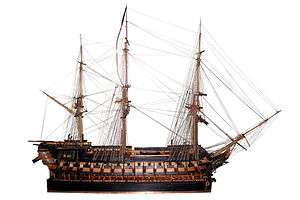French ship Rivoli (1810)
 1/40th scale model of Rivoli fitted with seacamels. | |
| History | |
|---|---|
| Name: | Rivoli |
| Namesake: | Battle of Rivoli |
| Builder: | Venice |
| Laid down: | 1807 |
| Launched: | 6 September 1810 |
| Name: | Rivoli |
| Acquired: | Captured from the French on 22 February 1812 |
| General characteristics | |
| Class and type: | Seventy-four Téméraire class ship of the line |
| Displacement: | 1 630 tonnes |
| Length: | 52 m (171 ft) |
| Beam: | 14 m (46 ft) |
| Draught: | 7 m (23 ft) |
| Complement: | 3 officers + 690 men |
| Armament: |
|
The Rivoli was a Téméraire class ship of the line of the French Navy.
Rivoli was built in Venice, whose harbour was too shallow for a 74-gun to exit. To allow her to depart, she was fitted with seacamels.[note 1]
On her maiden journey, under Jean-Baptiste Barré, the British 74-gun third rate HMS Victorious intercepted her on 22 February 1812. Her crew was inexperienced, and in the ensuing Battle of Pirano, the British captured Rivoli after some 400 men of her crew of over 800 were killed or wounded.[2]
The Royal Navy subsequently recommissioned her as HMS Rivoli. On 30 May 1815, under Captain Edward Stirling Dickson, she destroyed the frigate Melpomène off Naples.
Sources and references
Notes
- ↑ Rivoli and Mont Saint-Bernard were the only two French ships of the line to use this system.
Notes
- ↑ Troude, op. cit., p. 157
- ↑ "No. 16600". The London Gazette. 5 May 1812. pp. 851–852.
Bibliography
- HMS Rivoli
- Troude, Onésime-Joachim (1867). Batailles navales de la France. 4. Challamel ainé. pp. 152–153.
This article is issued from
Wikipedia.
The text is licensed under Creative Commons - Attribution - Sharealike.
Additional terms may apply for the media files.